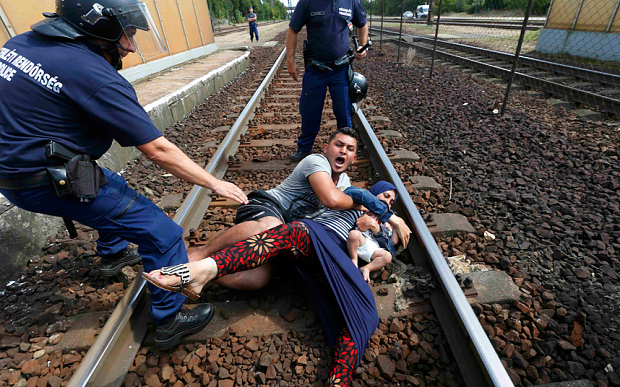“If I had known what I would face in Hungary, I wouldn’t have left Syria,” one refugee told al-Jazeera’s Mohamed Jamjoom at a crowded train station in Budapest, where Hungarian authorities have prevented asylum seekers from boarding German bound trains -a standoff that is entering its second day. This follows Germany’s announced promise to grant Syrian refugees asylum upon arriving into their land.
After a perilous journey to start a new life, for a refugee to favor suffering in Syria over humiliation in Hungary speaks volumes.
The growing numbers of Syrian refugees who have put their lives -and the lives of their families- on the line in pursuit of the most basic of human rights -the right to live- have set their eyes on Germany as a destination where they hope to find sanctuary.
In order to reach European borders, the plight of a Syrian refugee is one of unimaginable pain and in many cases, certain death. One can only try to fathom the dire circumstances which force refugees to decide on leaving their birthplace, their families and their homes.
The journey for many begins with arriving into Turkey which harbors the highest amount of Syrian refugees in the world. However, Turkey is often not the final destination; it is only the beginning.
Another route into Europe has seen more tragedies than those which refugees have hoped to leave behind. Through paying illegal smugglers, often spending their entire savings, many hope to find their path into Europe. However, fighting through the Mediterranean waves, several do not make it.
Between separation and death, many families have been deemed to be more common occurrences, they are separated forever.
According to UNHCR, over 2,500 people have died trying to cross the sea.
For many who survive the horrendous crossing of the Mediterranean, upon arriving on the Greek shores, they embark on a much longer journey to Germany which usually takes them through Macedonia, Serbia and Hungary.
In an act of determination, despite the Hungarian prevention of refugees to board what is hoped to be Germany-bound trains to salvation, a number of refugees have decided to keep going nevertheless. They decided to make the 171 km journey to the Austrian border on foot.
According to Google Maps, the journey would take 49 hours of nonstop walking to reach Austria. “It may seem far-fetched, but they are intent on reaching the border,” commented al-Jazeera’s Andrew Simmons.
Although Hungary has allowed Syrian refugees to enter, it is not out of compassion. Hungarian Prime Minister, Viktor Orban said on Thursday that his country does not wish to take in a large number of Muslims, and like many Eastern European countries, have rejected any EU proposed quota system for accepting migrants.
“I think we have the right to decide that we do not want a large number of Muslim people in our country,” he told reporters outside EU headquarters in Brussels.
Slovakia has joined Hungary in its prejudiced stance towards Muslim Syrians by stating that only Christians could enter the country. Ivan Metik, Slovakian Interior Ministry spokesman, justified his country’s decision by telling the BBC that “we could take 800 Muslims, but we don’t have any mosques in Slovakia; so how can be integrated if they are not going to like it?”
Meanwhile, it is not difficult to see why many Syrians are desperate to reach Germany given how they have been warmly welcomed by Germans, unlike their Eastern European neighbors.
In football matches around the country, many fans have held aloft banners reading “Refugees Welcome”. Furthermore, the German FC Bayern Munich has announced on Friday that it would raise one million Euros for Syrian refugees, and plan to set up a training camp for asylum seekers. That comes in addition to their announced act of solidarity that before Bayern’s next match against Augsuburg, players will enter the field holding hands with young refugees.
Buses and trains harboring Syrians arriving in the country have been greeted with applause and countless Germans welcoming asylum seekers with food and water.
For Syrians, Germany is a safe haven where they can start the lives they have dreamt of as soon as they set foot off the migrant boat. They have traveled through borders, camped on the streets for nights on end. To think being barred from entering a train will stop them is underestimating the sheer will and determination. If they have to walk almost impossible distances, then walk they shall.
Following suite, UK Prime Minister David Cameron has announced on Friday that the UK would welcome in thousands more of Syrian refugees; a total change of discourse by the Prime Minister in which he had previously described the refugees as “coming in in swarms.”
The decision, the Prime Minister said, is in addition to the 900 million pounds already spent in aid by the UK to develop refugee camps in Jordan and Lebanon.
It is nevertheless worth admiration the distances humans are willing to go in order for life to go on.
“I will learn German, and then go back to college and finish training as a dentist,” hopes 20-year-old Sara Mardini on the rough road to finding a new life, reported The Guardian.






Comments (11)
[…] From War to Rejection: The Perilous Journey of a Syrian Refugee – This follows Germany’s announced … destination where they hope to find sanctuary. In order to reach European borders, the plight of a Syrian refugee is one of unimaginable pain and in many cases, certain death. […]
As a Hungarian and volunteer helper of the Syrian and Afghan refugees myself, and also a news reader I am very sad that a journalist can use the above picture without checking where it is coming from. Please watch the whole video of this very incident and decide yourself.
http://www.telegraph.co.uk/news/worldnews/europe/hungary/11841913/Syrian-refugee-throws-wife-and-baby-on-to-train-tracks-in-protest-to-migrant-camps.html
There are thousands of Hungarians who help refugees from their own money in their free time. If you have any Syrian refugee contact be free to ask them about the amount of help they received while staying in my country. They will say that although the government is not a friendly one, people helped them so much with halal warm food, medical care, many offered their own home to stay, played with their children and gave them lots of love… Please be just to my country from such a distance and don’t spread any information of which origin you haven’t checked.